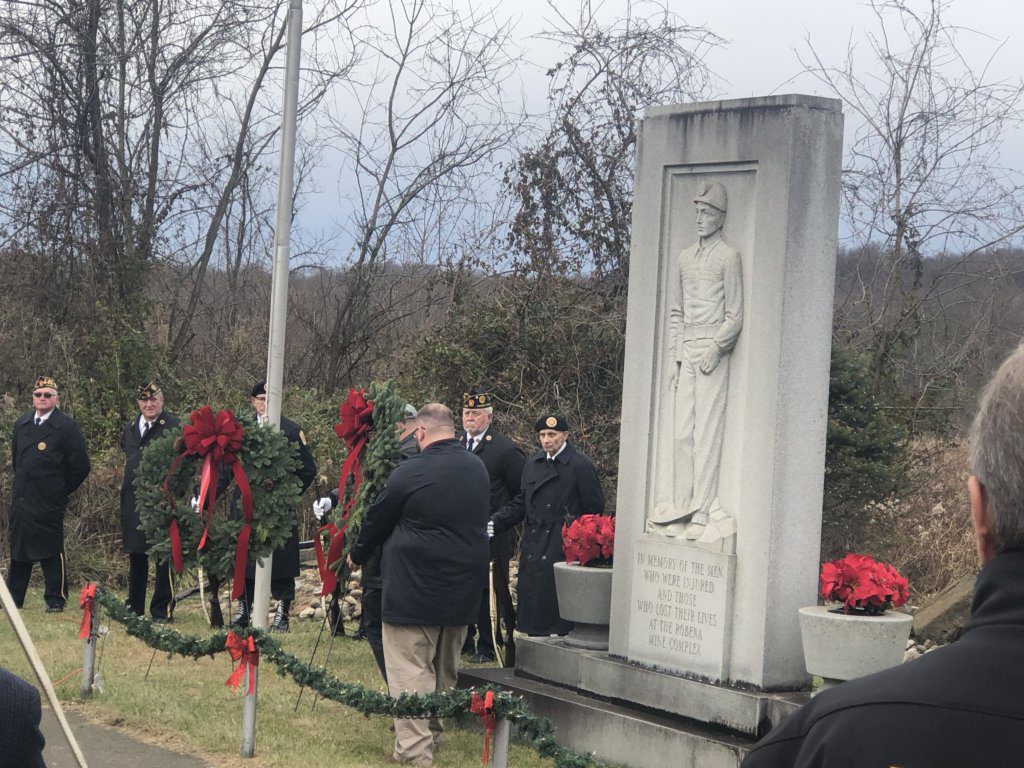Source: Herald Standard
Date: December 10, 2019
Unlike the 29 degree temperature at the Robena Mine’s Frosty Run Shaft on Dec. 6, 1962, when an underground explosion took the lives of 37 coal miners, those who gathered at the Robena miners’ memorial for the 57th anniversary memorial ceremony basked in relatively warm temperatures.
According to Maryellen Pallow, administrative assistant for the United Mine Workers of America, between 150 and 175 attendees gathered at the site for the annual memorial service. One of those in attendance, Lynn (Blacka) Boyd of Eighty Four remembers coming home that fateful day at age 13 and learning that her father was in the mine at the time of the explosion.
“It took several days before we heard the news [of my father’s death],” Boyd said. “Every time the news came on the TV, we’d turn it off. One day, my uncle David came to the house to tell us my father was one of the dead miners.”
Boyd and her family originally thought her father, William, had been part of the rescue team, but after a period of waiting for what seemed like an eternity, the rescue effort retrieved his body.
“We never got to see him because the casket was closed,” Boyd said. “My youngest brother was 8 at the time and was robbed of his childhood, as we all were. While we did have a tree and gifts that year, Christmas has never been the same since. A group of people sent toys to the miners’ kids, and it meant quite a lot to us. One of the gifts was an ornament I have to this day.”
Because of the mine explosion that took her father’s life two and a half weeks before the holiday, Boyd said she still hates Christmas.
“It’s also made a difference to my children because I’ve never been able to give them the joy that comes along with the holiday,” she said.
The blast took place at 1 p.m. According to the UMWA, 170 men were in the mine at the time of the explosion. One hundred thirty-three miners made it to safety. Of those killed, the youngest was Albert Bronakoski, who was 18 at the time.
The blast area was about 680 feet underground and between three and four miles from the mouth of the shaft. The force of the explosion was so strong it knocked down men working underground more than two miles away.
Ironically, Dec. 6 was the 55th anniversary of the nation’s most fatal mine disaster on record, in which 361 miners were killed on Dec. 6, 1907 at Monongah, W. Va, according to the Mine Safety and Health Administration (MSHA).
At last Friday’s memorial service, Charles (Chuck) Knisell, International District #2 vice-president, served as master of ceremonies.
“We come together each year to pay homage to those who lost their lives in the Robena mine,” Knisell said. “Because the event took place just before Christmas it made a tremendous impact on the wives and children of these miners. It’s a day they and we will never forget.”
“These miners, however, didn’t lose their lives in vein because they spurred the creation of safety laws and regulations that followed the explosion,” he continued. “Unfortunately, throughout our history, these laws were reactive rather than proactive. It took a disaster to implement mine safety regulations. It’s up to us to continue to remember this event so we never forget.”
Following opening remarks by Marlon Whoolery, president, UMWA Local Union #1980, Father Rodney Torbic, a Serbian Orthodox priest and honorary member of Local #1980, gave the invocation.
Penny Whoolery sang the National Anthem and the Veteran’s committee of UMWA #1980 recited the “Pledge of Allegiance.”
In his keynote address, Levi Allen, UMWA International Secretary-Treasurer, called coal mining one of the most dangerous and difficult jobs in U.S, history. During his speech, he underscored the fact that over 100,000 U. S. miners had lost their lives on the job and another 100,000 developed Black Lung.
“Men and women who go down into the mines confront a blackness we never see,” Allen said. “They brave darkness, noxious gases and defy gravity by holding up the ground we stand on. They do this in pursuit of the American dream, to have a roof over their head, food on their table and hope for their children.”
“Today, we remember our roots – our miners,” he continued. “As we stand and fight for and love one another, we’re keeping alive our promise to the Robena miners – that their story will never be lost.”
The Robena Mine Memorial is located on Route 21 near Masontown.
Written by: Dave Zuchowski


